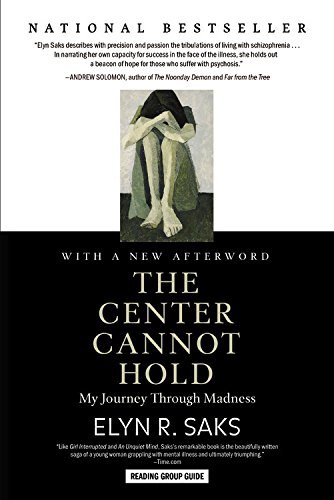Elyn Saks is dean and professor at USC law school, after successful undergraduate training at Vanderbilt, Oxford University as a Marshall Scholar, Yale Law School, and ultimately receiving a doctorate in psychoanalytic science. What’s even more amazing than the achievements themselves is the fact that she has accomplished everything while simultaneously trying to manage her psychosis. Her autobiography, The Center Cannot Hold, describes the experience of balancing her inner mental demons with fulfilling her responsibilities in the outside world – a divide that is common for people living with psychosis. How does she balance the temptation to go down the rabbit hole of unreality or to struggle and cope with the everyday reality that people without this disease take for granted? It would seem to be extraordinarily difficult and exhausting to carry on a simple conversation or study for a test, much less give a lecture to a large class or write big, important papers/ books, with such distracting thoughts.
As with many individuals suffering from schizophrenia, although there was a prodromal phase, her first full-blown psychotic break occurred in her early 20s. College is often the moment when people with a propensity for psychosis have their first break. It may be the natural course of illness or the stress of leaving home for the pressures of academic demands, but psychosis typically first appears at this moment in life.No matter how good one’s prior academic functioning, once the psychosis develops, because it manifests as thought disorder, it can be very difficult todo what used to come so easy. In this eloquent memoir, Saks attributes her success and recovery to having a good support system, whether that be doctors, friends, or family. Although Saks was exquisitely sensitive to change, especially as she moved from one school to the next, in each setting she was able to find a small group of people who helped guide and steady her as her symptoms worsened. This support system was invaluable and probably helped her push through what were obviously very scary times in her life.
Throughout the autobiography, Saks describes how exhausting it was and is to balance the chronic inner turmoil in her mind with her awareness of the real, external world. It was as if she were living in two worlds at once. Schizophrenia is a lifelong illness, and there were many psychotic relapses. But it is Saks’ resiliency that I most admire, her willingness to fight to beat or at least manage her illness. She truly believes that “Intelligence, combined with discipline, could overcome any challenge” (183)—a life lesson that all of us can learn from. She tried to mask her symptoms and act normal: “Perfecting this acting, this seeming, was vitally important if I were going to make my way in the real world” (190). Everyone, regardless of our own challenges, can try to emulate her fortitude.
Saks had difficulty reconciling her identity as she lives in these two worlds. At times, she was inclined to deny the fact that she has a mental illness that requires taking antipsychotic medication every day. The wish that she was“okay” was very enticing, and she was tempted to stop medication and began to think of her illness as a weakness that could be fought with willpower alone. But she continued to push through, and what worked best for her was forming a good relationship with a therapist and engaging in talk-therapy/ psychoanalysis coupled with antipsychotics.
Importantly, Saks also discusses the perils of stigma as she discovers that she cannot always share the fact that she has schizophrenia. She worked hard to hide this side of her identity because she was ashamed, “surely someone of my intelligence and discipline should be able to exert more power over herself” (153), and people also would think lower of her and think she is incapable of carrying out the particular job/ teaching position. Saks says, “One of the worst aspects of schizophrenia is the profound isolation—the constant awareness that you’re different, some sort of alien, not really human” (193). Saks’ story illustrates just the opposite: people with schizophrenia are not at all that different than “normal” people. Saks’ eloquence makes the experience of psychosis understandable. Unlike other psychiatric syndromes which everyone experiences to some degree (e.g. anxiety, depression), these are not common experiences(which is why memoirs like Saks’ are so important). This memoir is particularly interesting since it is unusual for an individual with a thought disorder to be able to sufficiently organize her thinking to be able to write such an introspective book, let alone make a career where systematic and logical thinking are necessary. Saks is an incredibly impressive woman and her memoir provides a beautiful understanding of what goes on in her mind.
The Center Cannot Hold shares what it is like to actually suffer from psychosis. Saks’ book humanizes this disorder, allowing the reader to empathize with her and learn what the experience is like – how to deal with the symptoms, how to manage participating in the real world, how to handle the stigma, and how to cope with difficult feelings of one’s self and identity. She shares with us the difficulties of the disorder itself, in addition to how difficult it is to live in a stigmatized and restricting society like ours is today. However, Saks’ story is incredibly inspiring, and it truly amazes me how much she has accomplished despite constantly experiencing psychosis. Most importantly, we know that college students are vulnerable to developing schizophrenia, despite whatever prior success we might have had, and we should all take seriously Saks’ message that it was her support system that has helped her to recover. Creating trusting relationships in our college campuses is not only an important safety net for ourselves, but also for our friends who might be struggling with their first break. Everyone deserves a community in which they feel supported and accepted.



